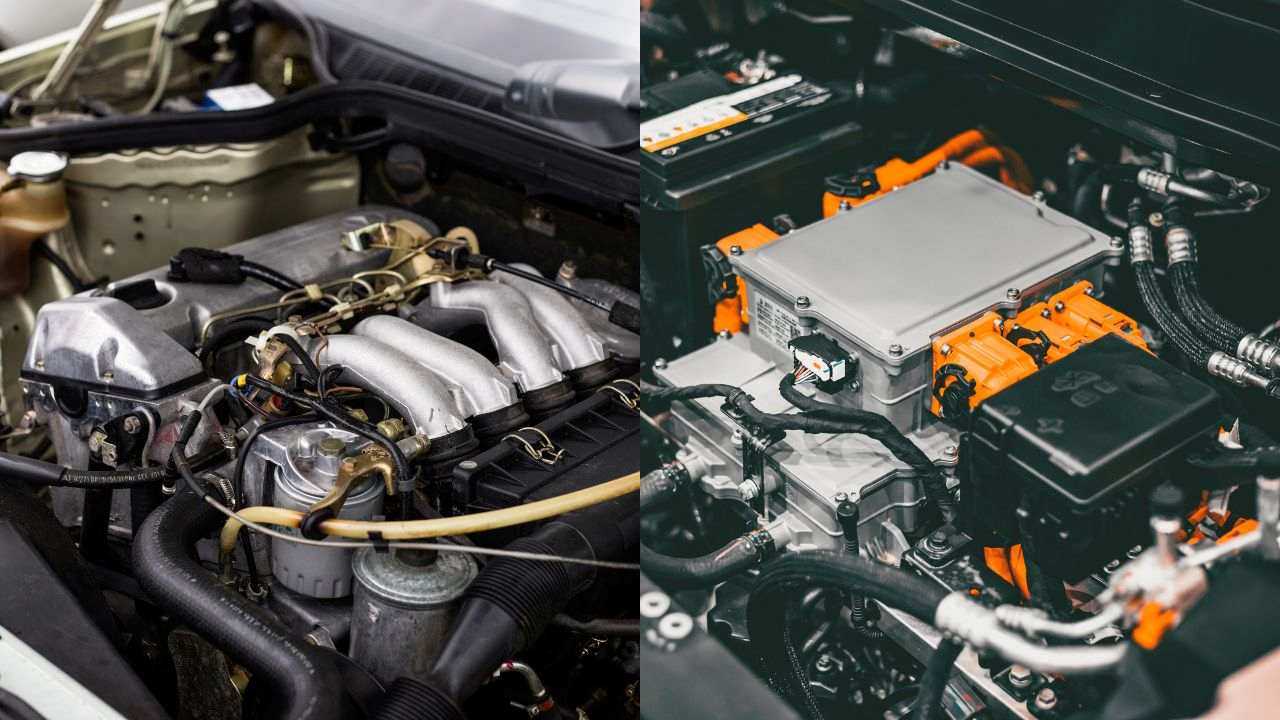9000+ Cashless Garages
96% Claims Settled (FY 24-25)

9000+ Cashless Garages
96% Claims Settled (FY 24-25)



Engines and motors power the vehicles we rely on, but they work in completely different ways. There are two types of engines: internal combustion engines and electric motors. An internal combustion engine burns fuel such as petrol or diesel inside the engine to produce energy. This energy then turns the car's wheels.
On the other hand, the electric motor runs on electricity from batteries. It consumes no fuel and is noiseless. In this article, we will explore the pros and cons of each. Understanding them helps one determine which car to buy, depending on its intended use.


An internal combustion engine generates motive power by burning petrol, oil, or other fuel with air inside the engine. The combustion in such a small space occurs inside a cylinder, forming hot gases that are used to shift the pistons in the engine.
These pistons work towards turning the wheels of the car. ICE engines are commonly found in most vehicles. They are sturdy and can travel long distances, but emit harmful gases into the atmosphere. Over time, ICEs have proven very efficient but rely on fossil fuels.
An electric motor is more environmentally friendly than an internal combustion engine. It works by generating magnetic fields and converting electrical energy into mechanical energy. They have fewer moving parts, need less maintenance, and have a longer lifespan.
Although they rely on rechargeable batteries, electric motors do not emit any emissions when in operation. This means they have cleaner air and a lower carbon footprint. This makes them much better substitutes than traditional ones.
Both Internal Combustion Engine and electric motors perform the same function, i.e., powering cars, but in completely different manners. Here is a closer comparison:
The performance characteristics of both differ fundamentally. The following are some of the most pertinent factors influencing performance:
The term efficiency refers to the amount of energy an engine or motor saves. The efficiency of ICE and Electric motors is as given below:
The efficiency of the internal combustion engine (ICE) is given below:
Electric motors are significantly more efficient than internal combustion engines (ICES). Here are the key points of its efficiency:
Internal combustion engines and electric motors vastly differ in many ways. Some of those differences are illustrated below:
The environmental impact of a vehicle depends on the type of engine. Now, let’s break down both types of engines:
The ownership and maintenance costs for ICE vehicles and electric vehicles differ. This is crucial because their technologies differ. Here are the key points to compare what drives ownership costs in each of these two options:
Switching from ICE vehicles to EVs is gaining quite impressive momentum in India. The government is promoting it with the FAME scheme. Under this scheme, the government provides subsidies of up to ₹1.5 lakh to those purchasing electric cars. Since there are no tailpipe emissions from an EV, it significantly reduces carbon dioxide and nitrogen oxides.
Thus, in cities and elsewhere, there is marked improvement in the air itself. Electric vehicles in India might cut greenhouse gas emissions by 60% by 2030. This estimate was provided by the International Council on Clean Transportation. The transition to electric mobility is necessary for India to achieve net-zero emissions by 2070.
Many challenges exist for users who want to shift from ICE vehicles to EVs, and EVs have provided many advantages. However, some barriers still exist that do not allow people to accept them fully, like:
Electric vehicles are typically more expensive than traditional internal combustion engine (ICE) vehicles. It is only because of the cost of their battery. Though the governments offer some incentives, many find them unaffordable compared to conventional cars.
The biggest challenge is the installation of charging stations. Even in rural areas, denser gas stations are still lacking. More and more charging points are coming up. Therefore, travelling a long distance may be challenging for electric vehicle users.
The fear of running out of charge before one finds a charging station. New electric vehicles can now range farther. Some buyers worry they'll be stuck without a nearby place to charge. Such anxiety deters some buyers.
The electric car's battery is expected to last approximately 8-10 years. But it is rather costly to replace. Although EV maintenance is generally cheaper than that of an ICE car, replacing the batteries may be more costly.
Most people do not understand why they should use EVs. The benefits include lower running costs, environmental advantages, and reduced maintenance. A lack of information may keep individuals from considering EVs